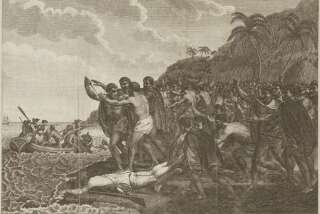A Discovery of a More Complex America
- Share via
It was a staple of our grade-school history lessons, the inspiring tale of the intrepid explorer who discovered the New World.
You could not grow up in America without absorbing the legend and the lexicon of the exploits of Christopher Columbus, who sailed across the ocean blue in fourteen-hundred ninety-two.
It was a story that shaped the way we understood ourselves and our history, a secular version of the biblical Genesis story for generations of American schoolchildren. . . . A tale reduced today to a backdrop for department store sales, and a day of vacation for federal workers.
It was inevitable, I guess. In recent years, the simple saga of our youth has been eclipsed by a truth that is both darker and more complicated.
Was Columbus really the hero we thought we knew, whose vision and bravado set the stage for an America built on the sweat and spirit of generations of immigrants like him? Or did his arrogance and cruelty launch a chain of events that makes him to blame for centuries of slaughter and enslavement and stolen land?
Every year, it seemed, the Columbus Day holiday reignited our national debate over history’s view of his legacy, renewing a cycle of debate and defense, of celebration and denunciation.
And now, as we head toward a new century, the holiday’s luster seems to have dimmed, battered into submission perhaps by the fury of the argument swirling around it.
It passed this year with hardly a whimper . . . no parades, no celebrations, no day off from school. Not even the respite from freeway traffic typically associated with holidays.
*
The last few years have been frustrating and bewildering, for those who champion Columbus’ feats, those who condemn them, and those who try to teach children what, exactly, he exemplifies.
History books have made great strides from the simplistic versions of our youth. Fifth-graders today study the culture of the New World’s natives, as well as the conquests of the European explorers.
Even the staid National Council for Social Studies has urged its history teachers not to treat the Columbus saga “romantically,” but to help students understand that the land Columbus found was not “discovered” at all, “but was a world of peoples with rich and complex histories, dating back at least 15,000 years.”
Still, our nostalgia can make it a difficult subject to teach.
As one veteran fifth-grade teacher told me: “I learned it one way, and I love the story.” The romantic tale of a brave adventurer, a courageous queen and those darling ships with the adorable Spanish names.
For years, she made the story a central part of her history classes, with art lessons, oral reports and plays. Her students acted out the voyage, the discovery, the triumphant return to Spain.
Today, she stumbles as she teaches her mostly Latino class about Columbus, trying to coach herself to substitute “encounter” for “discovery,” and “settlement” for “colonization.”
She remembers being surprised seven years ago by the ferocity of protests among Native Americans during the celebrations of the 500-year anniversary of Columbus’ journey.
“I had no idea it was so controversial. After that, I just kind of stepped back and tried to look at it from [the Native American] point of view. And it all seemed so complicated . . . what was the message anymore, what was the use?”
In her class on Columbus Day this year, there was no performance, no big history lesson. Just a spelling test with words like “explorer” and “conquest.” And drawings done by the students of the Nina, the Pinta and the Santa Maria.
*
It has been a rough voyage through rocky seas for the Columbus tale these last few years. But even his detractors don’t necessarily want to forgo the holiday.
“It’s not about hating Columbus or Columbus Day, or wanting it to disappear. What we want is to hear our perspective represented: When Columbus landed, we got annihilated. And America needs to acknowledge that it’s not just Christopher Columbus and the three ships and everything was fine,” says Native American filmmaker Valerie Red-Horse Mohl.
The real tragedy, some say, is that the debate became so polarized that celebration came to imply racist arrogance, and ignoring the holiday seemed the only socially appropriate alternative.
“I don’t think America has ever said through the Columbus Day celebrations that it wasn’t all positive, that America is not just a country that was colonized by Europe,” Red-Horse Mohl says.
“It’s a lot more complicated . . . just like America.”
Sandy Banks can be reached by e-mail at Sandy.Banks@latimes.com.
More to Read
Sign up for our Book Club newsletter
Get the latest news, events and more from the Los Angeles Times Book Club, and help us get L.A. reading and talking.
You may occasionally receive promotional content from the Los Angeles Times.










